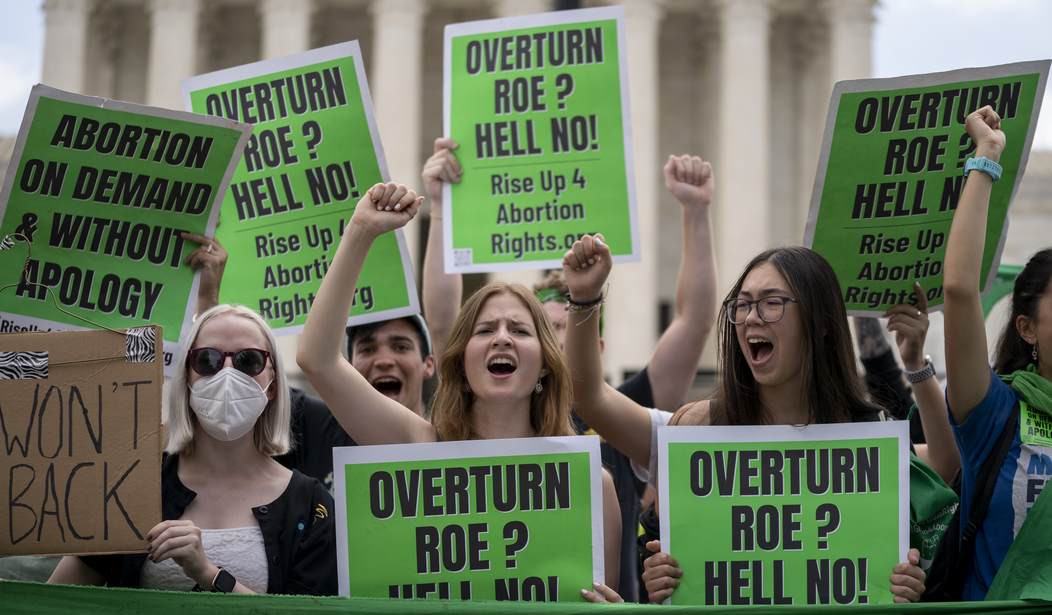Democrats have pushed to make the 2024 elections about abortion rights, and they are getting it in spades—but not in the way they wish. So it goes with the Georgia Supreme Court, where Justice Andrew Pinson, a 2022 appointee of Governor Brian Kemp, won the election to serve a full, six-year term on the court.
A sitting state Supreme Court justice fought off a spirited challenge from a candidate who campaigned on protecting abortion rights in Georgia.
The Associated Press called the race for Justice Andrew Pinson at about 9:30 p.m. Tuesday.
As of Wednesday morning, Pinson had about 55% of the vote in the head-to-head race against John Barrow, whose efforts to make the race a referendum on abortion rights turned the contest into one of most closely watched on Tuesday’s ballot in Georgia.
Just as in Texas, South Carolina, Florida, Idaho, and several other states, Georgia's heartbeat law has been a boilover for the pro-abortion left and the subject of lawsuits to restrict the laws or to see them overturned.
The state Supreme Court has already rejected a narrow challenge to Georgia’s six-week abortion ban, but a legal challenge testing the constitutionality of the law under the state Constitution is still pending in Fulton County.
Pinson's opponent made abortion rights his primary platform point and gained the endorsements of all the abortion lobbyists.
State Supreme Court races are typically low-key affairs that are officially nonpartisan. But Barrow’s unusual campaign style energized both sides of the abortion debate, ruffled feathers in the judiciary and spurred Kemp to publicly rally behind his appointee, setting aside $500,000 and being featured in a pro-Pinson ad.
Barrow racked up endorsements from organizations like Planned Parenthood Southeast Advocates while groups like anti-abortion Frontline Policy Action came out in support of Pinson.
Despite bringing the heat, the inflamed rhetoric, and the dollars, the makeup of the Georgia Supreme Court will remain solidly conservative, at least for the time being. With the 2023 enshrinement of abortion in the Ohio constitution and the recent pro-abortion win on the repeal of the 1864 Arizona abortion ban, Democrats have been feeling their oats and assuming that the next challenge to pro-life laws and policies, whether electorally or legislatively, will be decided in their favor. Abortionists now have their sights on overturning Florida's heartbeat law through the ballot initiative Measure 4, which, if approved by the voters, would codify abortion rights in the Florida constitution. But here you have a contrast between a purple state, which is quickly morphing into blue, and a solid red state. Just as Dobbs v. Jackson Women's Health removed the federal cudgel of Roe v. Wade and sent these abortion law decisions back to the individual states, so these individual state decisions will look different depending upon their legislators and judiciary.
On May 16, the South Carolina 5th Circuit Court upheld its heartbeat law.
South Carolina 5th Circuit Court Judge Daniel Coble upheld the Fetal Heartbeat and Protection from Abortion Act, dealing Planned Parenthood, the state’s largest abortion business, a solid defeat.
“This Court,” he wrote, “will never supplement the will of the General Assembly with its own interpretation because it would be a direct violation of the Constitution and the sacrosanct doctrine of the separation of powers.”
“[I]t is clear beyond a shadow of a doubt,” Judge Coble wrote, “that the General Assembly intended, and the public understood, that the time frame of the Act would begin around the six-week mark.” Planned Parenthood argued in its latest lawsuit that its abortion business has declined by 75 percent in South Carolina as a result of the Fetal Heartbeat Act. It argued that the fetal heart is not developed until the ninth week of the baby’s life and therefore the killing of unborn children should be legal until that point.
[...]
“The role of this Court is not to determine whether the law is good or bad, whether the policy should be one way or the other, or to be outcome determinative based on personal views,” Judge Coble wrote. “The role of this Court is to simply determine the intent of the legislature in the enactment of the law in question and whether the actions of the legislature are within the bounds of the constitution as derived from the will of the people.”
On Sunday, the Minnesota legislature closed out its session but allowed a measure to die which would have put an equal rights amendment codifying abortion on the 2026 ballot.
The Minnesota legislature last night failed to approve a deceptive measure to put the so-called Equal Rights Amendment (ERA) on the ballot in 2026. The House passed the bill (SF 37) early Sunday, but the Senate did not take it up before the midnight deadline. The proposed ERA, if ratified by voters, would enshrine a policy of unlimited abortion in the Minnesota Constitution, but the language presented to Minnesotans on the ballot would say nothing about the issue.
“Minnesotans all across the state have been telling their legislators: We don’t want abortion-up-to-birth permanently mandated by our Constitution,” said MCCL Co-Executive Director Cathy Blaeser. “Nor do we want you to deceive us about what you’re really trying to do. Polls show that most Minnesotans don’t want abortion added to the ERA, and most don’t want unlimited abortion. This ERA isn’t about equal rights at all. It’s extreme, exclusionary, and dishonest.”
This shows another contrast between a deeply red state and a deeply blue state, yet the decisions made by the legislature and the courts were similar: in support of their constitutions and laws, and alternatively, a culture of life.
Decisions will be coming down soon on FDA v. Alliance for Hippocratic Oath, concerning the abortion pill, and Moyle v. United States/Idaho v. United States, surrounding Idaho's enforcement of their Defense of Life Act banning abortion. Those decisions will determine the trajectory of the battle through November. So, while abortion may be on the ballot in 2024, there are no guaranteed outcomes in the Democrats' efforts toward re-federalizing abortion.
It’s pretty simple: a vote for Democrats is a vote for abortion. The right to murder babies is all they have to run on.
— Erik Reed (@ErikReed) May 22, 2024
While Donald Trump and other Republican politicians do not embody all my Christian values, they’re not hell bent on destroying them. That’s the difference. https://t.co/qXvumXwLYm
Nevertheless, pro-life activists and Republican candidates need to unify and target their messaging to secure victories not only in elections, but in policy and in advancing a culture of life.














Join the conversation as a VIP Member